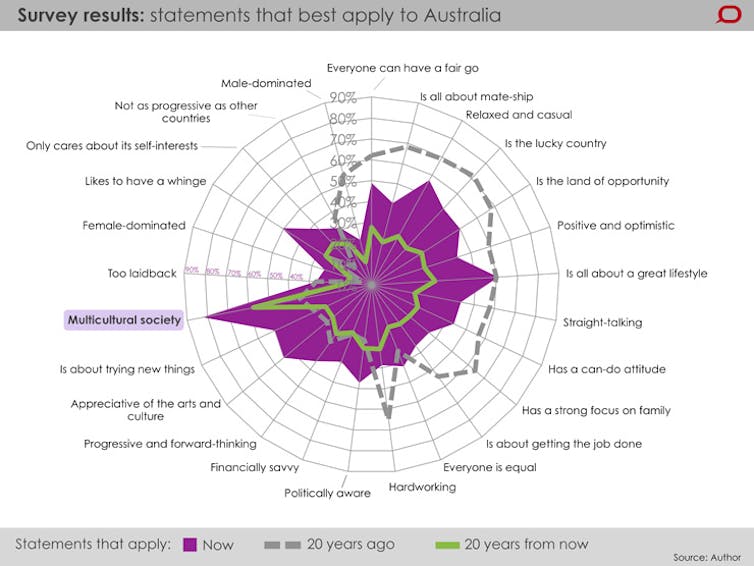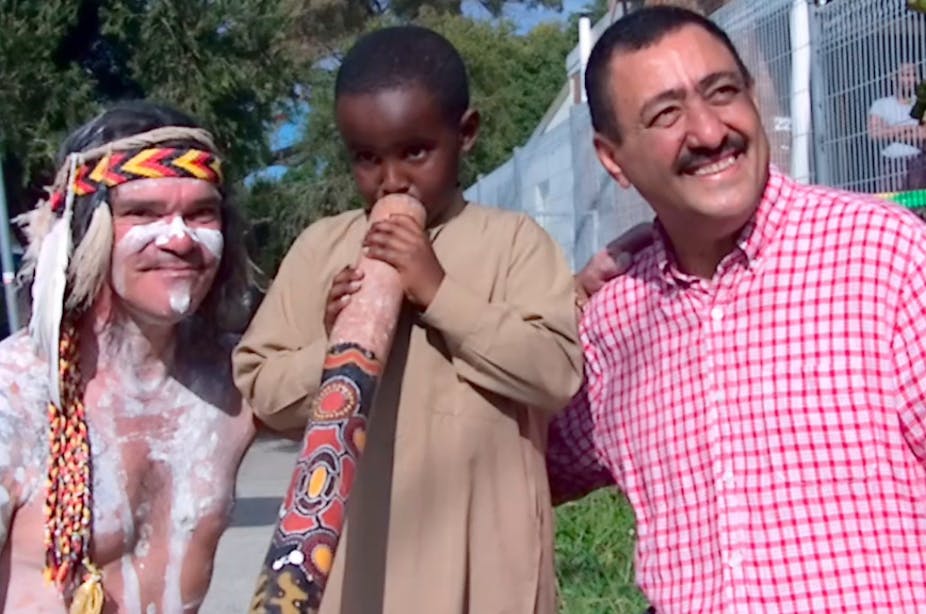Australia seems to be becoming a more polarised society. This is the simple conclusion from recent research undertaken for SBS, which looked for answers to how Australians think the country has changed over the past 20 years, and where they think it may be in another 20 years.
A more “traditionalist” group (perhaps as high as 47%) wants conservative certainties, rejecting or fearing social change. A large middle group (around a third of Australians) is “open-minded” about the future, but highly protective of its own lifestyles and interests. Only a “cosmopolitan” minority (one in five) is drawn towards new opportunities while welcoming an evolving and changing world.
Evidence from the Census for the past two decades reveals some basic information. Australians are ageing; we are more culturally diverse; we live in smaller family units or alone; we are less religious; and we consume more stuff per head.
The divisions between us – the shape of the society we desire and the threats we fear – are deepening. The focus is on apprehension about, as against desire for, diversity and innovation. The multicultural future that all expect to increase lies at the heart of these tensions.
Those surveyed agree that the main changes that have happened are those that have made us more multicultural and more materialistic. Over half of those asked believe that 20 years ago, Australians were easygoing, friendly and outgoing, trustworthy, unpretentious and “tough”. But today, less than half believe that these descriptions are accurate.
We do think, though, that we’ve become more social – moving out from a concentration on family – and slightly more open-minded, intelligent and creative, though hugely more materialistic. We are as racist and discriminatory, and a bit less sexist – though much more ageist – than we were then.
Mateship, though, is on the decline; we whinge more; and we’re less positive and optimistic. There is a huge gap between between “how Australians see themselves in the media” and “how Australians really are”.
The next generation, we believe, will continue to experience a multicultural society, though we are very divided on what we think of this. Our concerns are affected by how we think we will be placed in the future economy. While a significant group see an improved quality of life (37%), almost as significant a group see the future as leaving them worse off (28%).
The positive shape of the future has to do almost totally with economic opportunity. The negative aspects are both economic and social, with competition for employment and a perception of too many immigrants contributing to the apprehension.
Given the unanimity about our continuing development as an immigration society, Australians’ worries bear out similar work by Monash University for the Scanlon Foundation. The SBS-commissioned research reveals two clusters of values at work: immigrants are threatening when they “don’t buy into the Australian way of life”, “don’t speak English” and “contribute to overpopulation”.
Others, however, take an opposite view: they worry about racism in Australia, Australia’s harsh policies on asylum seekers and our perceived lack of tolerance.
Of those surveyed, Australians of non-Anglo background are far more likely to agree that Australia is much less racist than it used to be, while “Anglos” think we have stayed much the same. Non-Anglos see less materialism in Australia than Anglo-Australians. They are more trusting of immigrants, while being more fearful of the expansion of racism in the future.

So what does research like this do for an organisation like SBS, which strives to reflect Australian multiculturalism? The fact that Australia is becoming more diverse suggests the future looks good. But with potentially half the sample being “traditionalists” who are looking for confirmation of their prejudices, there is still a hefty base for the Anglo-conformity of the mainstream commercial channels and the ABC.
In a sense, then, SBS has a three-pronged challenge. Firstly, it has to treat the cosmopolitans with respect, hold them, and feed their hunger for innovation, diversity and exploration. Secondly, it has to convince the open-minded that the experience it offers is exciting enough without being scary – that it’s not just about “Sex Before Soccer” (though the soccer is what will position the channel in this, a World Cup year).
Then there’s the traditionalists. Does SBS try to win some of them over (they are the heartland of the big-money spenders on advertising staples), or give them away because chasing them could too easily compromise the brand for the 53% who are already potentially onside?
The research seems to be saying we need and many people want social institutions, including broadcasters and social media sites, that will respect diversity, celebrate creativity and build integration between different communities and generations. There’s already research that shows how social media like Facebook are weaving together new networks of friendship that until then were dissipating in the rush to individualism and materialist self-indulgence.
New communities of interest and association are forming, and not dissolving again as used to be the case in the earlier years of the internet. Now they are clumping people together for longer, allowing networks to spread.
The research suggests that SBS would be well advised to further build its own unique brand. It can become an institution that knits together Australia’s diversity as an immigration nation.

